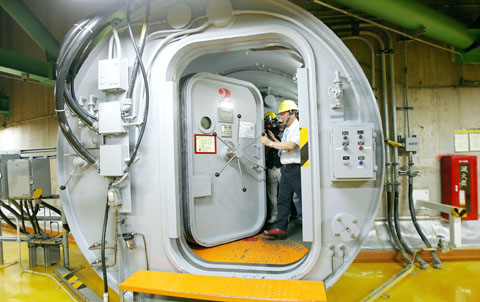Taiwan Power Co (Taipower, 台電), the nation’s biggest electricity producer and monopoly grid operator, is considering adding as many as 10 reactors to existing nuclear power plants to reduce its reliance on coal and gas.
The utility’s grid has the capacity to accommodate two additional reactors at its No. 2 nuclear power station, company vice president Hsu Hwai-chiung (徐懷瓊) said in an interview yesterday, without giving a timeline. The company’s No. 3 and No. 4 nuclear plants also have space for new units, he said.
Taiwan has three nuclear stations in operation and one under construction. Without adding reactors, Taipower would need to build new coal-fired or natural gas-fueled power plants to meet rising demand for electricity, according to Hsu.

PHOTO: MAURICE TSAI, BLOOMBERG
“We’re conducting an internal study,” Hsu said. “We have yet to report to the government, which needs to conduct an assessment and dialogue with the public is also needed.”
Atomic reactors accounted for 13 percent of Taiwan’s electricity generation capacity in June, compared with at 29 percent from coal-fired generators and 37 percent from gas units, according to the company’s Web site.
Taipower has postponed four times the start of the No. 4 plant, located 40km east of Taipei, because of safety concerns and an increase in construction costs. The plant has two units with a planned capacity of 2,700 megawatts, accounting for 6 percent of Taiwan’s installed capacity when completed. Taipower is scheduled to load fuel into the first unit in February next year and start commercial operation late next year, Hsu said.

IN THE AIR: While most companies said they were committed to North American operations, some added that production and costs would depend on the outcome of a US trade probe Leading local contract electronics makers Wistron Corp (緯創), Quanta Computer Inc (廣達), Inventec Corp (英業達) and Compal Electronics Inc (仁寶) are to maintain their North American expansion plans, despite Washington’s 20 percent tariff on Taiwanese goods. Wistron said it has long maintained a presence in the US, while distributing production across Taiwan, North America, Southeast Asia and Europe. The company is in talks with customers to align capacity with their site preferences, a company official told the Taipei Times by telephone on Friday. The company is still in talks with clients over who would bear the tariff costs, with the outcome pending further

NEGOTIATIONS: Semiconductors play an outsized role in Taiwan’s industrial and economic development and are a major driver of the Taiwan-US trade imbalance With US President Donald Trump threatening to impose tariffs on semiconductors, Taiwan is expected to face a significant challenge, as information and communications technology (ICT) products account for more than 70 percent of its exports to the US, Chung-Hua Institution for Economic Research (CIER, 中華經濟研究院) president Lien Hsien-ming (連賢明) said on Friday. Compared with other countries, semiconductors play a disproportionately large role in Taiwan’s industrial and economic development, Lien said. As the sixth-largest contributor to the US trade deficit, Taiwan recorded a US$73.9 billion trade surplus with the US last year — up from US$47.8 billion in 2023 — driven by strong

A proposed 100 percent tariff on chip imports announced by US President Donald Trump could shift more of Taiwan’s semiconductor production overseas, a Taiwan Institute of Economic Research (TIER) researcher said yesterday. Trump’s tariff policy will accelerate the global semiconductor industry’s pace to establish roots in the US, leading to higher supply chain costs and ultimately raising prices of consumer electronics and creating uncertainty for future market demand, Arisa Liu (劉佩真) at the institute’s Taiwan Industry Economics Database said in a telephone interview. Trump’s move signals his intention to "restore the glory of the US semiconductor industry," Liu noted, saying that

STILL UNCLEAR: Several aspects of the policy still need to be clarified, such as whether the exemptions would expand to related products, PwC Taiwan warned The TAIEX surged yesterday, led by gains in Taiwan Semiconductor Manufacturing Co (TSMC, 台積電), after US President Donald Trump announced a sweeping 100 percent tariff on imported semiconductors — while exempting companies operating or building plants in the US, which includes TSMC. The benchmark index jumped 556.41 points, or 2.37 percent, to close at 24,003.77, breaching the 24,000-point level and hitting its highest close this year, Taiwan Stock Exchange (TWSE) data showed. TSMC rose NT$55, or 4.89 percent, to close at a record NT$1,180, as the company is already investing heavily in a multibillion-dollar plant in Arizona that led investors to assume